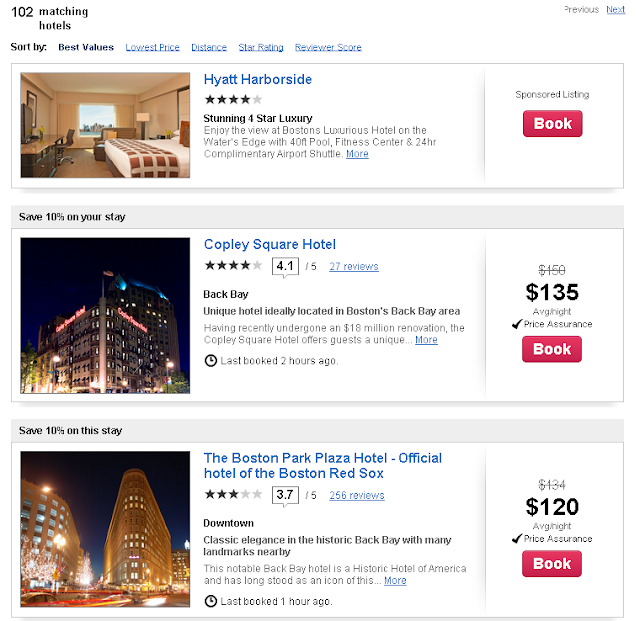The Nerdery
They may have had to endure years
of being picked last in gym class, but they are kings of the hill in today’s
professional world. Nerds, that is. With rapidly changing technology and a
shift from in-store to online shopping, those who are smart and tech-savvy have
a lot to offer Internet-based retailers. Global online travel company Orbitz even has a special office in Sunnyvale, California for these important staff
members—The Nerdery (Karp, 2012).
Thanks to the ingenuity of its
nerds, the leadership of chief executive Barney Harford, and the interest of
Wall Street Journal reporter Dana Mattioli, Orbitz was put under the microscope
earlier this year for the way it was collecting and using information about its
customers. Sparking the most debate was Orbitz’s finding that its Mac-using
customers are 40 percent more likely than their PC-using counterparts to make
reservations at four- and five-star hotels, prompting the retailer to place high
star (and higher-priced) hotels at the top of the search results for Mac users
(Mattioli, 2012). The Apple-loving Mac crowd cried foul, threatening to stop
using Orbitz (Adhikari, 2012), while the company “defended its actions in a
statement provided to MSNBC, saying it is simply ‘reflecting’ its knowledge of
customer habits to provide smart recommendations” (Gordon, 2012, para. 4).
The tools
A little research shows that
Orbitz employs a variety of tools to collect data about its website visitors, both
those who register with the company and make purchases, and those who simply
search the site as guests. By going to the Orbitz website with the free
application Ghostery turned on, I was
able to see that the 13 different tools shown to the left were tracking my visit.
While Ghostery does not explain
exactly how Orbitz is using these tools, they likely serve a variety of
purposes such as: setting cookies, so Orbitz will remember my search
preferences; tracking where visitors come from and how they navigate the
website; running A/B testing, allowing Orbitz to experiment with different
versions of Web pages; and tracking the performance of ads on the site.
If this amount of “surveillance”
seems intrusive, keep in mind that Orbitz discloses all of its tracking on its Privacy Policy page.
Here, the travel company reveals that it uses: cookies to collect data about purchases
and site visits, geo-location tools to identify where visitors are, AppNexus to
show visitors ads on other website, and surveys to gather anonymous aggregate
information (Orbitz, 2011). All of this data is in addition to the details
visitors divulge willingly when registering for an Orbitz account or making a
purchase. This information could include name, address, email, gender,
lifestyle preferences, and preferred travel destinations.
Is it all too much?
Harford argues that Orbitz is
simply trying to bring back the “magic” of the old-style travel agent (Karp).
You know, the friendly gentleman with whom your grandparents used to book cruises
and weekend getaways. He knew his customers well, keeping a detailed file of
their past bookings and remembering their travel preferences. Harford hopes
this kind of “customer intimacy” will lead travelers to choose Orbitz over
competitors because they feel it “knows” them better (Karp).
Orbitz uses the data it collects
primarily in an effort to provide website visitors with the most relevant and
appealing results when they search for a hotel.
Knowing that vacation seekers will move to Expedia or Priceline if they
do not find what they want quickly from Orbitz, the company makes educated
guesses, based on both personal and aggregate data, about the hotels that would
interest a particular user. Would she like a kid-friendly hotel with a pool or
a business-friendly hotel with a conference room? Is she a fitness fanatic
partial to smoke-free establishments with exercise rooms? Is a free continental
breakfast an important amenity? Does she belong to any hotel loyalty programs? Harford
noted:
Getting a highly
relevant set of options into those first five slots is really critical for us,
and we think there is huge opportunity here for us to use personalization to
improve the trip planning experience for our customers. (De Lollis, 2012, para.
6).
What more could Orbitz do?
It appears that Orbitz is already
using several tools and strategies to learn about its website visitors and
market to them. Listed below are recommendations for additional ways the
company could use Web analytics (although it is possible that Orbitz is already
employing these tools).
Behavioral targeting for email
With an average return on
investment of $40 for every $1 spent (compared with $17 for keyword ads and $2
for banner ads) (Didier, 2012), email marketing should be a major part of
Orbitz’s marketing strategy. The company could further multiply its ROI by a
factor 18 (Neifield, 2001) by using its vast amount of behavioral and
demographic data to target emails to particular users or groups of users. For
example, Orbitz could email details about a reduced rate at a Disney hotel to
users who had recently searched for Disney vacation packages. Or, it could
email a special follow-up offer to visitors who had entered the sales funnel,
but abandoned their carts before completion of the purchase. A few companies
offering email marketing products with behavioral targeting (identified only
through a Google search) are Net-Results,
Listrak and Marketing Pilot.
Phone call tracking
Considering that 63 percent of
website visitors complete a purchase offline,
being able to link phone purchasers to their online search data would help
companies evaluate their marketing initiatives more accurately (Burnes, 2012). Orbitz
provides a phone number on its website for those who are in need of “expert
advice” or simply prefer to give their credit card numbers to a human being.
Whether or not a customer makes a purchase during a phone call, the interaction could still provide value through data or simply relationship building.
Several tools are now available
that would allow Orbitz to connect phone call inquiries to keyword searches,
online promotions or specific customers. In addition to learning more about the
source of leads, the company could augment its data on individual users with
information gathered through a phone conversation. The Google Analytics
Application Gallery offers 25 options for phone
call tracking.
Analytics for Apps
In 2011, the amount of time users
spent on mobile apps exceeded the time spent on the Web (Wasserman, 2011). Estimating that 20 percent of its hotel purchases this year were made on mobile
devices, Orbitz has a general Orbitz app, a hotel app, and additional apps in the
works for other categories, such as flights, (Kapko, 2012). It is important for
the company to collect and analyze data about this growing segment of customers
and how they are using its apps (although I suspect Orbitz probably already
is). Google Analytics offer a free tool, Mobile App Analytics, while many paid
options are listed on the mobyaffiliates
blog.
Your thoughts
As demonstrated by the many strategies and tools mentioned above, Orbitz and other e-retailers not only have access to a wealth of data about their website visitors, but also have a wealth of products available to them to help gather and analyze the information, and then use it to further personalize the online shopping experience. As a consumer, do you feel this growing practice infringes on your privacy or do you appreciate the benefits of more customized marketing messages?References
Adhikari, R.
(2012, June 26). Orbitz and Mac users: Analytics gone wrong or analytics gone
just right? MacNewsWorld. Retrieved
December 7, 2012 from http://www.macnewsworld.com/story/75478.html
Burnes,
R. (2012, April 20). How to integrate inbound call tracking with online
analytics [Weblog post]. Retrieved December 8, 2012 from http://blog.hubspot.com/blog/tabid/6307/bid/32485/How-to-Integrate-Inbound-Call-Tracking-With-Online-Analytics.aspx
De Lollis, B.
(2012, May 9) Orbitz: Mac users book fancier hotels than PC users. USA Today. Retrieved December 7, 2012
from http://travel.usatoday.com/hotels/post/2012/05/orbitz-hotel-booking-mac-pc-/690633/1
Didier, E. (2012,
April 2). Boost your email marketing ROI by focusing on three key areas. Marketing Profs. Retrieved December 8, 2012 from http://www.marketingprofs.com/articles/2012/7500/boost-your-email-marketing-roi-by-focusing-on-three-key-areas
Gordon, R. S.
(2012, June 26). Orbitz tailors marketing to Mac users’ expensive tastes. MSNBC.
Retrieved December 7, 2012 from http://leanforward.msnbc.com/_news/2012/06/26/12418408-orbitz-tailors-marketing-to-mac-users-expensive-tastes?chromedomain=digitallife&lite
Kapko, M. (2012,
Nov. 12). Smartphones account for 1 in 5 hotel bookings on Orbitz. Clickz. Retrieved December 8, 2012 from http://www.clickz.com/clickz/news/2224271/smartphones-account-for-one-in-five-hotel-bookings-on-orbitz
Karp, G. (2012,
Jan. 29). Orbitz counting on tech to be the ticket on ride to greater success. Chicago Tribune. Retrieved December 7,
2012 from http://articles.chicagotribune.com/2012-01-29/business/ct-biz-0129-orbitz-20120129_1_orbitz-worldwide-online-travel-carroll-rheem
Mattioli, D.
(2012, Aug. 23). On Orbitz, Mac users steered to pricier hotels. Wall Street Journal. Retrieved December
7, 2012 from http://online.wsj.com/article/SB10001424052702304458604577488822667325882.html
Neifield, R.
(2001, Sept. 20). E-Mail marketing: Behavioral targeting by default? Clickz. Retrieved December 8, 2012 from http://www.clickz.com/clickz/column/1712989/email-marketing-behavioral-targeting-default
Orbitz. (2011,
Dec. 15). Orbitz privacy policy. Retrieved December 7, 2012 from http://www.orbitz.com/info/win?id=PrivacyPolicy
Wasserman, T.
(2011, June 20). Consumers now spending more time on mobile apps than the Web
[STUDY]. Mashable. http://mashable.com/2011/06/20/app-use-overtakes-web-use/






This comment has been removed by a blog administrator.
ReplyDelete